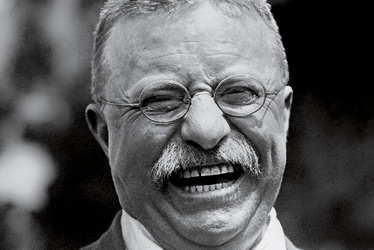Americans, it seems to me, peruse history in search of those who wear white hats, ride up on white horses to the accompaniment of trumpets sounding. Conversely, we look in history for villains, with their curled mustaches and shifty eyes. History is a war between the good guys and the bad guys. This is not a helpful way to read history, and, in a circuitous way, is also damaging to the Christian gospel. Be patient with me, and I will try to connect all this.
Note first: there are bad guys in history, people about whom the only redeeming thing that can be said is they did not murder their own mothers. We know who these are.
The record on most other people is decidedly mixed. The problem with the "hero-villain" approach to historiography (that's how we write history, please try to stay awake) is that when we find our heroes, we either minimize or downright deny their flaws. Jefferson was a great man, therefore we refuse to admit he wasn't a Christian, or had an affair with a slave. He simply couldn't have! It tarnishes his shiny badge.
What got me thinking about this is watching Ken Burns's series on the Roosevelt's. It is not the series itself, which I think is thus far very well done (I've only seen 6 hours of the 14). It is, rather the response to it by Amity Schlaes. Ms. Schlaes's argument, in brief, is that Ken Burns makes the Roosevelt's into heroes, when they ought to be regarded as villains. TR broke up the trusts which caused the railroads to crash (on Wall Street, not on the rails), and his old foe, white hat J. Pierpont Morgan, had to ride over the ridge to save the day! Big business good! Meddling federal government bad! But, Ms. Schlaes overlooks a very inconvenient fact in this narrative, which is that many of the trusts were built in complicity with the government. In other words, big business and big government were often in cahoots against the little guy. Burt Folsom does an excellent job of putting this on display in his book The Myth of the Robber Barons. The narrative isn't big business as the good guys, and an overweening federal government as the bad guys. Big business did some bad things, and so did the government. Both did good things, too.
I'm not sure Ms. Schlaes would feel the same about TR had she survived the Triangle Shirtwaist fire or had to eat some of that delectable Chicago slaughterhouse meat, or if she had, at the age of nine, to work 12 hour days in a factory and go home to a dumbbell tenement. I'm not arguing here for whether or not the federal government has a role in those sorts of things, that is an argument for another time. The point is, history is complicated and Ms. Schlaes tries to separate out heroes and villains. Don't. Let human beings be human beings be fully drawn with all their warts and their massive failings. Mighty triumphs are not minimized by human frailties.
We read the Bible looking for heroes and villains too. Children's Bibles make the patriarchs and David out to be heroes. Yay! Look at David, slaying those Ammonites. Look how trusting Abraham was, offering up Isaac on the altar, knowing God could raise the dead! Reading through Genesis and 1 & 2 Samuel will smash your rose colored glasses. All of God's people had serious, awful flaws. They did things that, were the average elder to do them today, would get him not only defrocked, but probably flogged. If he repented, we might grant him forgiveness. But we'd watch him, alright. There but for the grace of God we go.
Which brings us to grace, which is what it is all about. Part of looking for heroes and villains is convincing ourselves of our own righteousness. We find those with whom we can compare ourselves favorably, and think, "I thank thee that I am not as other men are....and especially not like that tax collector!" God has helped me be righteous --that's my "gospel" as I live it out, even if my words say otherwise. It is no gospel at all. The only gospel is "God have mercy on me, a sinner, because of what your son did on my behalf." Grace is realizing I am as messed up as anyone else is. Grace is a God who loves big time sinners like Jacob and Abraham and David. Decent people don't think they need grace. I am anything but decent, from the inside out.
So, Mr. Ford, history isn't quite bunk, but we can present it that way. Let's not.

No comments:
Post a Comment